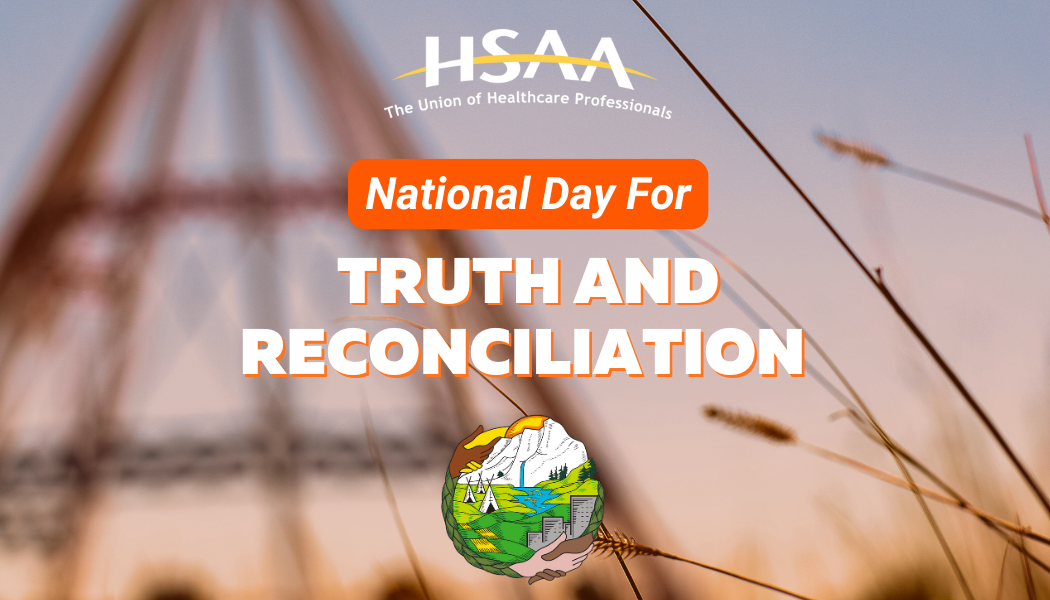The National Day for Truth and Reconciliation marks a time to reflect on the legacy of Canada’s residential school system — on the lasting trauma and impacts of residential schools on generations of Indigenous peoples and how we can move forward in the spirit of reconciliation to build a better society for all treaty people.
We must acknowledge Indigenous peoples’ contributions to our communities and to the labour movement, which are often overlooked as part of our shared history. For example, it’s not widely known that the first documented strike in Canada took place at Oxford House, Manitoba, where Cree boatmen refused to work for the Hudson Bay Company for only ten pelts per season and demanded they receive the same pay (forty pelts) as their counterparts at York Factory for the same work.
It is our responsibility, as union members in the labour movement, to continue the tradition of standing for what is right so we build a society that is equitable and just for everyone.
HSAA health-care professionals reaffirm our commitment to champion core union values of diversity, equity and inclusion, and to advocate for the implementation of the Truth and Reconciliation Commission of Canada: Calls to Action, specifically those relating to health (#18-24).
To move forward in our commitments, we must acknowledge the truth of residential schools and the lasting impacts on lives, cultures and traditions. This pain did not end with the closing of the last residential school or with the conclusion of the Truth and Reconciliation Commission; it continues to show up in the health and wellbeing of our society. We need to confront the systemic racism and barriers to access that exist in health care for Indigenous Peoples, and address the unacceptable health disparities faced by First Nations, Inuit and Métis.
While Alberta has made an official acknowledgment that the current state of Indigenous health is a direct result of government policies, action to address this situation has been insufficient. HSAA will continue to advocate for improved access to public health care for Indigenous communities.
The National Day for Truth and Reconciliation is an important reminder that we must all commit to learning our history, becoming aware of the impacts and taking action towards a better future for all. In that spirit, the rest of our message includes things you can do this weekend to honour the National Day for Truth and Reconciliation and some of HSAA’s commitments to reconciliation.
The journey to reconciliation in Canada is a shared responsibility, and we hope you join us in this commitment.
In solidarity,
| Mike Parker, President |
Leanne Alfaro, Vice-President |
4 things you can do this weekend to honour the National Day for Truth and Reconciliation
There are many ways to honour and participate in the National Day for Truth and Reconciliation across the province and the country. If you are looking for a starting point, here are four easy things you can do this weekend
-
Wear your orange shirt on September 30 to mark the Orange Shirt Day movement started by Survivor Phyllis Webstad.
-
Read and familiarize yourself with the Commission’s 94 Calls to Action – specifically actions relating to health (#18-24) and learn about the progress on these Calls to Action.
-
Attend an NDTR event in your community, or watch “Remembering the Children: National Day for Truth and Reconciliation” broadcast from Parliament Hill.
-
Watch HSAA’s award-winning documentary “Treaty Walk: A Journey for Common Ground.”
HSAA’s commitments to reconciliation
-
This past Convention, HSAA members created a new Indigenous Board Member position. An election recently took place to elect this Indigenous Board Member seat.
-
A new working group begins meeting this month. They are tasked with the goal of creating an Indigenous Circle at HSAA. This initiative will bring together Indigenous members to support and advise on promoting our Union in the workplace and creating a culturally safe union.
-
We continue to offer educational opportunities with Blue Quills University, a formal residential school, to teach members the history and legacy of the residential school system and gain a better understanding of intergenerational trauma and our role in reconciliation.
-
HSAA is committed to advocating for equal access to public health care for Indigenous communities to address the unacceptable health disparities faced by First Nations, Inuit and Métis Peoples.
-
An Unconscious Bias workshop is available to members to address the impacts of unconscious bias in the workplace and our Union. Everyone can be susceptible to unconscious bias, but we must learn to recognize it and see how it influences unintentional behaviours.
-
A resolution passed by members at the 2023 Convention reaffirmed HSAA’s commitment to advocating for the implementation of the TRC Calls to Action, specifically on health (#18-24).
